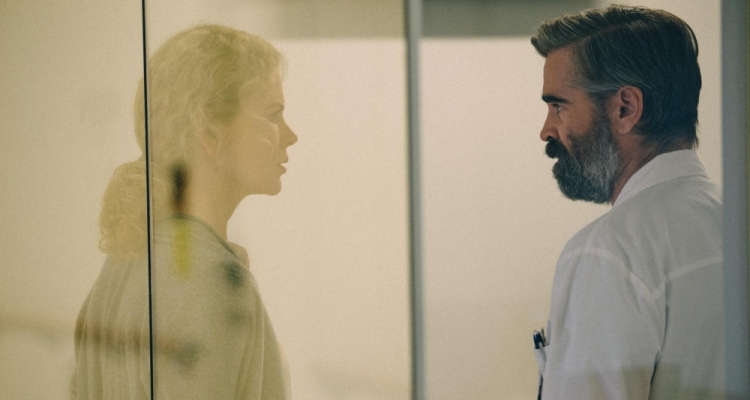The Playlist: I wanted to quickly go back to the tone of this movie. Colin, you had again worked with Yorgos before, Nicole you hadn’t. When you guys were on set what sort of conversations were there on how to deliver the lines? To hit the film’s unique tone?
Nicole Kidman: It was not a discussion at the time, it just naturally happens. And, I don’t know how it happens, it’s sort of strange, because there’s a rhythm, but there’s no discussion of that.
Colin Farrell: To be honest, yeah the same.
Nicole Kidman: And, most likely in many different ways, by the way. It’s not like it’s immediately what you get.
Colin Farrell: Yeah. And Yorgos seems, I think maybe Yorgos doesn’t just cast, but he vets, you know.
Nicole Kidman: Who would guess it?
Colin Farrell: Yeah, I know. And he would tell you himself if you were ever to ask him. He watches [previous] interviews [of actors] he’s thinking of having in his film. Then, obviously, he has a conversation with you, and I think he’s not just thinking who would be best in the role. Yes, that’s a concern of his, of course, but he’s also trying to test if you will understand the sensibility of his work so that he doesn’t have to say “this is what we’re going for” or “this is what I want us to reach. This is the moment that audience should gather that X,Y and Z is happening,” you know? It’s not an unspoken experience but his direction is very, very specific. It’s not in relation to how he wishes the film maker to inform the audience, or what necessarily takes place emotionally or psychological in a scene. There’s none of that objectification of it. It’s always very, very straightforward and very simple, so it allows the room for this kind of silent complexity, that never fully retires. And seems to draw the audience in to take place.

The Playlist: Colin you did an interview for the film that I read where you said, unlike “The Lobster,” you found it hard to describe what this movie was about. I don’t know if you changed your mind since that interview…
Colin Farrell: Yeah, I think that was bullshit by saying I can’t describe what “Killing Of A Sacred Deer’s” about, cause I think I gave the same answer when I was doing “The Lobster.” [Laughs.] No, I don’t. I really don’t know what it’s about. It sounds twee, like I’m trying to separate myself from the responsibility of the caring of what the film is about. But what it really is about is whatever the audience interprets it as being about. It truly is. You know because there are a set of circumstances, there are some plot points that are presented, there are a bunch of human beings that are acting and interacting around each other and having their own individual experiences, and then there is the collective experience of course, which takes place with the film, but what the film is about I don’t know. Scenes that are explored or controlled, family values, self preservation, the burden and the cost of pride, ambition, certainty verses uncertainty in an ever changing world? I mean all those things are explored, but what it’s about, you tell me Greg.
The Playlist: Well, I think you nailed it but I wanted to ask Nicole did you you think you knew what it was about? Did that change when you saw the film?
Nicole Kidman: I’ve seen it three times now and I have a different interpretation of it every time and I notice different things. It’s very, very dense this film. I think when you see it again and again, you see different things. But I do, the overall feeling from it, to me is, I mean it’s so much like you’re hypnotized by it.
And then they were gone. Whisked off to another phoner, TV interview or press conference as part of their very packed New York press day. And I wondered when I’d get that 10 minute (cough, just 10 minutes, cough) opportunity again. Guessing by their enthusiasm for working with Lanthimos, probably sooner than you’d think.
Luckily, I’ll have a new laptop by then. Or better handwriting. Maybe.
“The Killing of a Sacred Deer” is now playing in New York and Los Angeles.


